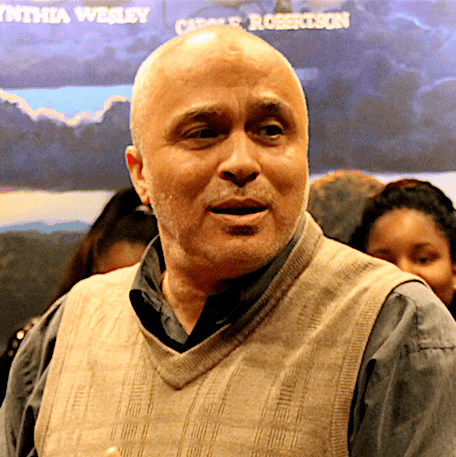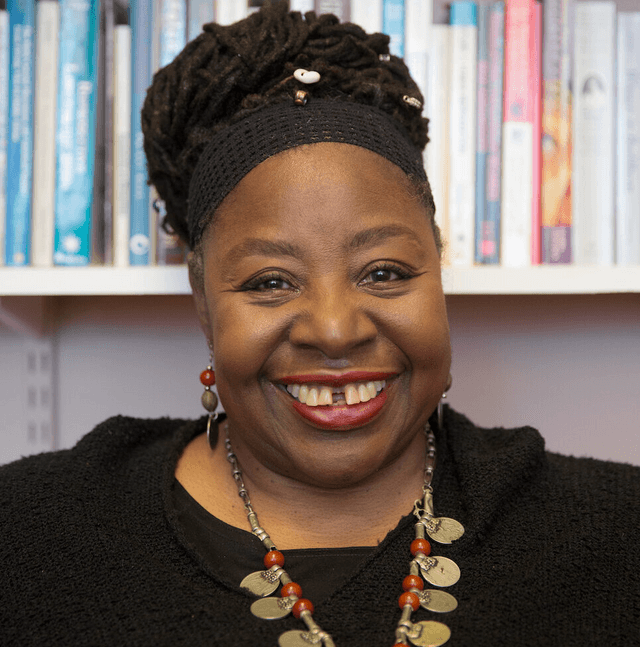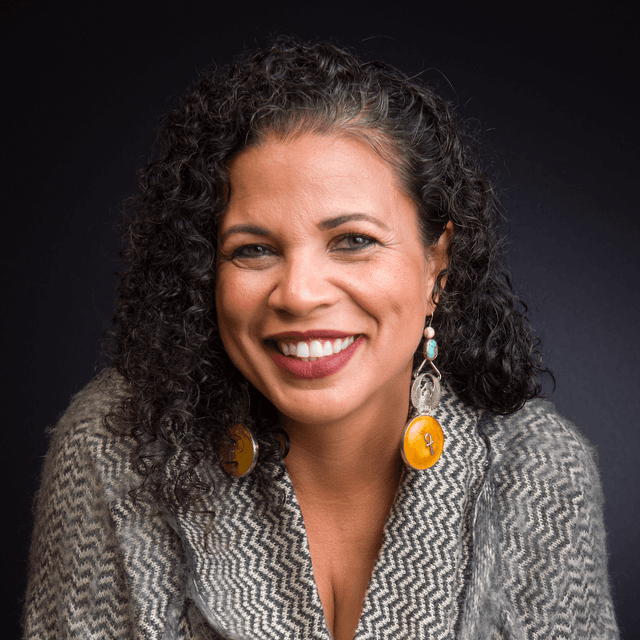Stacey Patton, PhD, is an award-winning author and journalist who writes about race, politics, popular culture, child welfare issues, diversity in media, and higher education. Through her workshops, keynote addresses, and multi-media presentations, Dr. Patton blends the power of her personal narrative with her expert knowledge of the history of American race relations.
Patton teaches journalism at Howard University in the Cathy Hughes School of Communications and is a research associate at the Institute for Urban Research at Morgan State University.
As an adoptee, child abuse survivor, and former foster youth, Patton is a nationally-recognized child advocate whose research focuses on the intersections of race and childhood. She is the author of That Mean Old Yesterday - A Memoir (Simon and Schuster), Spare the Kids: Why Whupping Children Won't Save Black America (Beacon Press), and the forthcoming book, Strung Up: The Lynching of Black Children and Teenagers in America, 1880-1968 (Beacon Press).
Patton's writings have appeared in the New York Times, Baltimore Sun, Washington Post, Chronicle of Higher Education, Al Jazeera, BBC News, DAME Magazine and TheRoot.com. She has appeared on MSNBC, Fox News, CNN, CBS, Al Jazeera, The Tavis Smiley Show, Here and Now, and Democracy Now.
She has received reporting awards from the William Randolph Hearst Foundation, Scripps Howard Foundation, New York Women in Communications, National (and New York) Association of Black Journalists, The Education Writer's Association, and she is the 2015 recipient of the Vernon Jarrett Medal for Excellence in reporting on American race relations. The American Professional Society on the Abuse of Children the American Professional Society on the Abuse of Children also bestowed her with the Outstanding Service and Advancement of Cultural Competency in Child Maltreatment Prevention and Intervention Award.
Critical Race Theory and the Great White Meltdown
Dr. Stacey Patton delivers a brilliant, bold, and hilariously incisive keynote that unpacks one of the most charged cultural debates of our time. With a sharp wit and fearless political commentary, this talk navigates the hysteria surrounding Critical Race Theory and the spectacle of "Caucasian Tears" that has gripped America’s public discourse.
Dr. Patton examines how the mere mention of Critical Race Theory has sent shockwaves through school boards, state legislatures, and social media platforms, igniting performative outrage and absurd political theater. Combining cutting-edge analysis with biting humor, the keynote explores themes of privilege, historical amnesia, and the cultural underpinnings of white fragility.
Drawing on her expertise as a historian, journalist, and storyteller, the keynote offers audiences:
- A clear, accessible breakdown of what Critical Race Theory really is—and isn’t.
- Insightful commentary on how racial anxiety shapes political rhetoric and policies.
- A hilarious yet sobering critique of the ways whiteness performs victimhood in the public sphere.
This keynote blends humor with depth, challenging audiences to reflect on the roots of racial tension while disarming them with laughter. It’s an unforgettable journey through history, culture, and politics that leaves attendees informed, entertained, and inspired to think critically about race in America.
Whether addressing academic audiences, diversity and inclusion professionals, or general audiences curious about the intersection of race and cultural commentary, Critical Race Theory and the Great White Meltdown is guaranteed to spark meaningful conversations—and maybe even a few tears of laughter.
Healing-Centered Pedagogy: Transforming Trauma Into Thrivance and Healthy Learning Environments
How can educators create safe learning environments for students who’ve experienced or witnessed a lifetime of trauma? They’ve lived through events like school shootings, police violence, racial uprisings, natural disasters, the pandemic. Or their personal lives have been scarred by physical abuse, sexual assault, neighborhood violence, poverty, neglect. Research has shown that by the time they reach college age, 66 to 85 percent of youth report lifetime traumatic event exposure, with many reporting multiple experiences. For Black, Indigenous, and other young people of color, young immigrants and refugees, queer youth, and current and former foster youth, the risk factors are even higher. In this session, Dr. Patton looks at healing-centered pedagogy, showing how trauma affects student learning and development, and shares ways to create safe learning spaces that help students thrive. She’ll offer practical tools and brain-based teaching strategies that can be used in person or in a virtual setting. Dr. Patton will also look at how to be a safe mirror for students without turning into a therapist and suffering compassion fatigue.
From Awake to WORK: Moving from Implicit Bias to Racial Equity
Implicit bias has become a popular buzzword in diversity, equity, and inclusion work, especially in the wake of recent social unrest in the United States. We’ve been taught to think about a racist as someone who consciously and intentionally seeks to hurt people based on race. But as many anti-racist researchers and scholars have noted, much of the racism that gets perpetuated is neither conscious nor intentional but is still harmful. Implicit bias implies that there’s a lack of awareness about racism, or that it is below awareness. Many people hide behind implicit bias as a way to say, “I don’t know how racism really works. I don’t have a role in perpetuating structural racism and violence.” They try to be dissonant about it. Understanding implicit bias is a good thing, but it is not enough — to effectively achieve racial justice and equity, we must focus on changing processes and systemic imbalances, not just changing minds. In this interactive behavior-based workshop, attendees will become grounded in the terminology on diversity, equity, inclusion, and justice as part of the spectrum of the work. Attendees will be prompted to think about their own assumptions and biases, behaviors, practices, and experiences. We will explore how to move beyond raising awareness of bias to learning how to embed ongoing DEI strategies in the institution’s priorities and values, day-to-day practices, processes, and operations.
"White Tears:" The Forensic History and Social Neuroscience of White Trauma and Racism
The term “white tears” has been used to describe the defensive and protective emotional reactions that white people exhibit when challenged about racism. These feelings of anger, fear, guilt, and disassociation are often weaponized against people of color and act as a barrier to understanding, healing, and systemic change. White tears are also a symptom of old unresolved complex traumas and destructive aggression that white people have inherited from previous generations of European ancestors who shared legacies of collective trauma prior to contact with Indigenous cultures around the world. Researchers have explored the transgenerational consequences of racial discrimination for the lives of African Americans and other historically marginalized groups and how those memories and pain is written in the DNA of these groups today. But what about white people? How did trauma become engrained in the genes of white people and lead to maladaptive behaviors such as racial discrimination against others perceived as threats? How did pain from hundreds or even thousands of years ago affect white people’s sense of safety, belonging, social engagement with and compassion for other groups? White Americans come from societies that suffered profound violence and trauma that was passed on from generation to generation. These traumatic experiences affected how their ancestors felt about themselves, interacted with each other from a space of survival mode, formed insecure attachment with offspring, parented in ways that ensured the survival of racism and racial violence. This workshop addresses the historical roots and legacy of white people’s collective traumas, starting from the Middle Ages in Europe on through the Black Lives Matter era. Attendees will receive an in-depth exploration of the wounds that white people inherited from ancestors who perpetrated colonization, slavery, apartheid, genocide, segregation, and other forms of racist state sanctioned violence. Using social neuroscience, the Polyvagal Theory, attachment theory, epigenetics and other brain-based approaches, we will learn how white people carry ancestral wounds beyond their conscious awareness and how multigenerational adaptive behavior continues to perpetuate cycles of individual and systemic racism.
Other Speech Topics Include:
Media Bias and Black Communities
The Historical Roots of Corporal Punishment in Black Communities
The Racist Roots of American Pediatrics
The Racist Devaluation of Black Children in American Education
Who's Afraid of Black Sexuality?
How The Crack Baby Grew Up: Race, Childhood and America's War on Drugs
Spare the Rod: Race, Religion and Corporal Punishment in American Life
The Lynching of Black Children and Teenagers in America, 1880 to the Present











